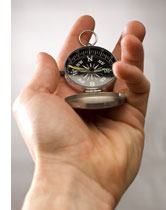Forward Steps to Recovery
Using Constructive Relapse-Preventive Thinking
 1. Thought Stopping: I’m not going to think about that; I’ve already made my decision.
1. Thought Stopping: I’m not going to think about that; I’ve already made my decision.
2. Thought Substitution: I’m in danger – I’d better be alert; I think I’ll call Bob; I think I’ll plan my vacation.
3. Debating/Disputing/Challenging Your Negative Self-Talk: Where is the evidence? Is this thought or belief true or valid? How does this thought or belief serve my best interest?
4. Coping Statements: This feeling will eventually pass; It’s hard, but not too hard; Condemn the behavior, not the person.
5. Positive Affirmation: I have said no to myself before – I can do so again; I’m going to treasure my sobriety; Even if I have lapsed, I can accept myself.
6. Review of Goals (Desirable Outcomes): I want to stop drinking – it’s my goal; I have already decided that I want to keep my relationship with my wife; I want to go home sober.
7. Review of Negative Consequences (Undesirable Outcomes): Eventually, I will lose my job; I can’t take two drinks without taking several more and getting drunk; My relationships will suffer.
8. Do Written Homework (Problem Sheet, ABC Sheet, or Drinking Sheet).
9. Reframing: Look at the situation from another angle or another person’s viewpoint. Look at the benefits of choosing not to engage in the addictive behavior.
10. Rational-Emotive Imagery: Imagine yourself behaving or feeling differently about the situation. Close your eyes and practice responding to someone in a different, more rational, more effective manner.
Using Constructive Relapse-Preventive Actions
1. Get involved in a project or a recreational activity.
2. Walk the other way.
3. If there are any remaining liquor, drugs, sweets, or other addictive substances in the house, throw them out or flush them down the toilet.
4. Call a friend.
5. Fill in a worksheet.
6. Do something intentionally to lift your spirits other than drinking or drugging: e.g., climb a mountain, go for a brisk walk.
7. Have some seltzer or other non-alcoholic beverage.
8. Go to a SMART Recovery meeting.
9. Read a chapter from Ellis and Velten’s When AA Doesn’t Work for You or another REBT self-help book.
10. Divert/enjoy yourself: Exercise, go for a walk, watch TV, play a game, cook, take a hot bath, have a cup of coffee, read the newspaper, listen to music.
